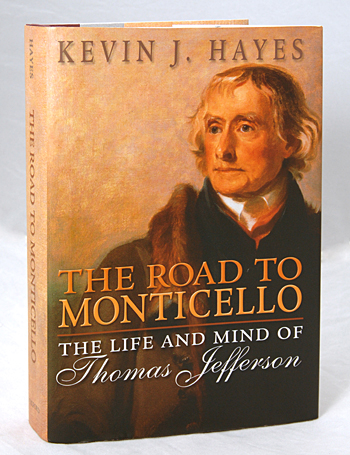Hayes, who received his doctorate from UD in 1991 and is a professor of English at the University of Central Oklahoma, writes that his purpose is to “study what Thomas Jefferson read and what he wrote to show how the written word shaped his life.” He views Jefferson through his literary and intellectual interests, which in turn had a profound effect on his thinking and writing. According to Hayes, “though there have been dozens of Jefferson biographies, remarkably, there has never been a literary biography until now.”
J.A. Leo Lemay, Henry Francis du Pont Winterthur Professor of English at UD, wrote about The Road to Monticello, “The world's leading expert on the book culture of early America, Kevin J. Hayes, brings an unsurpassed knowledge and sensitivity to the story of Thomas Jefferson's life of the mind. Incorporating much exciting new information, Hayes's biography makes a major contribution to scholarship, but it also appeals to general readers. The Road to Monticello is intellectual biography in the grand manner.”
The reviewer in the Library Journal “highly recommended” the book, stating, “Hayes demonstrates that Jefferson's life of the mind also merits the close study provided here.”
The reviewer in Publishers Weekly wrote “Hayes...takes us through Jefferson's hugely wide and eclectic reading with an ease and lightness often missing from a subject central to American history.”
The beginning chapters of the book deal with the early education of young Jefferson, born in 1743 at Shadwell plantation in Virginia, his years at William and Mary College, where, according to Hayes, Jefferson received an education that “far surpassed his expectations,” followed by reading law under George Wythe, who had a reputation as the “finest legal mind in Virginia.”
The book chronologically follows Jefferson's career and life, viewing history in terms of his books and his reading and his writing, from public documents to works such as Notes on the State of Virginia and his biography of Meriwether Lewis, as well as letters to his contemporaries, friends and family and his journals.
The book also includes excerpts from letters to Jefferson and diaries of those who knew him, who described his personality, his activities, his accomplishments and past. The result is a lively, personal portrait of an exceptional man.
Jefferson's love of books was paramount in his life, according to Hayes. When he was American minister to France, one of his chief pleasures was exploring the bookstalls and bookshops in Paris. Jefferson wrote, “while residing in Paris, I devoted every afternoon I was disengaged, for a summer or two, in examining all the principal book stores, turning over every book with my own hand....”
When he left the presidency, Jefferson sent four trunks of books, which with other packages of books weighed two and a half tons, to Monticello. The book also surveys his libraries, starting with the one at Shadwell, where the house burned to the ground in 1770 and only a few books survived.
The book follows Jefferson into retirement at Monticello, where he undertook the establishment of the University of Virginia with its signature building, the Rotunda, housing the library, and examines his writing, including his autobiography.
The book ends with Jefferson's final illness and death on July 4, 1826, with personal accounts by those who attended to him.
In his summation, Hayes wrote, “What Jefferson wrote more than 200 years ago lives on today....The powerful words of Thomas Jefferson created a nation and pointed the world toward democracy.”
Hayes also is the author of A Colonial Woman's Bookshelf, Melville's Folk Roots, An American Cycling Odyssey, 1887, and Poe and the Printed Word.
Article by Sue Moncure


